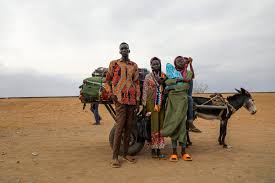
South Sudan Declares Cholera Outbreak Amid Refugee Influx and Severe Flooding
South Sudan’s health authorities have declared a cholera outbreak in Renk County, situated on the northern border with Sudan and serving as a primary entry point for refugees and returnees escaping the ongoing armed conflict. As of October 28, 2024, 50 suspected cholera cases, including six confirmed cases, have been reported among refugees, returnees, and the local community, sparking an urgent public health response.
In response to the outbreak, the cholera taskforce has been activated at the county level to coordinate efforts on the ground, with additional support from the national incident management system. Health officials are enhancing surveillance efforts by training health facilities on cholera case identification, mobilizing boma health workers for active case finding and contact tracing, and training 30 local health workers in sample collection and reporting.
"The Ministry of Health is aware of the difficult conditions refugees and returnees face, such as overcrowding and poor water and sanitation, which can lead to outbreaks. However, the Ministry is working with health, nutrition, and WASH [Water, Sanitation, and Hygiene] partners on the ground to minimize the risk of the outbreak spreading," said Yolanda Awel Deng, South Sudan’s Health Minister.
The ongoing challenges in Renk are compounded by unprecedented flooding that has devastated parts of South Sudan, particularly Upper Nile State, where Renk is located. The floods have displaced around 46,500 people and affected over 81,300 residents, placing vulnerable communities at heightened risk for infectious diseases like cholera.
The World Health Organization (WHO) has joined South Sudan’s health authorities in response efforts, establishing two cholera treatment units in Renk: a 10-bed unit at Renk Civil Hospital and a 4-bed facility at Wunthou point of entry. Currently, the recovery rate stands at 80%, with patients showing marked improvement under care.
In addition to setting up treatment facilities, WHO has deployed two rapid response teams comprising epidemiologists, infection control specialists, water, sanitation, and hygiene experts, as well as laboratory and risk communication officers. These teams are assisting with on-ground response coordination and surveillance efforts, with further public health and laboratory experts expected to arrive in the coming days.
To further bolster the response, WHO delivered 12 metric tons of emergency health kits to Renk on October 25. These supplies, capable of treating up to 74,000 people, include cholera treatment kits for severe and moderate cases, investigation kits, and logistical support items like cholera beds and tents.
"I commend the Government of South Sudan for its high-level response to the cholera outbreak in this fragile area of the country," said Dr. Humphrey Karamagi, WHO Representative in South Sudan. "WHO is committed to supporting the Ministry of Health in enhancing disease surveillance, improving response coordination, and ensuring the availability of medical supplies."
As flooding and the influx of displaced persons continue to challenge public health in South Sudan, health authorities and partners are ramping up efforts to prevent further spread of cholera and protect vulnerable populations in one of the country’s most challenging regions.